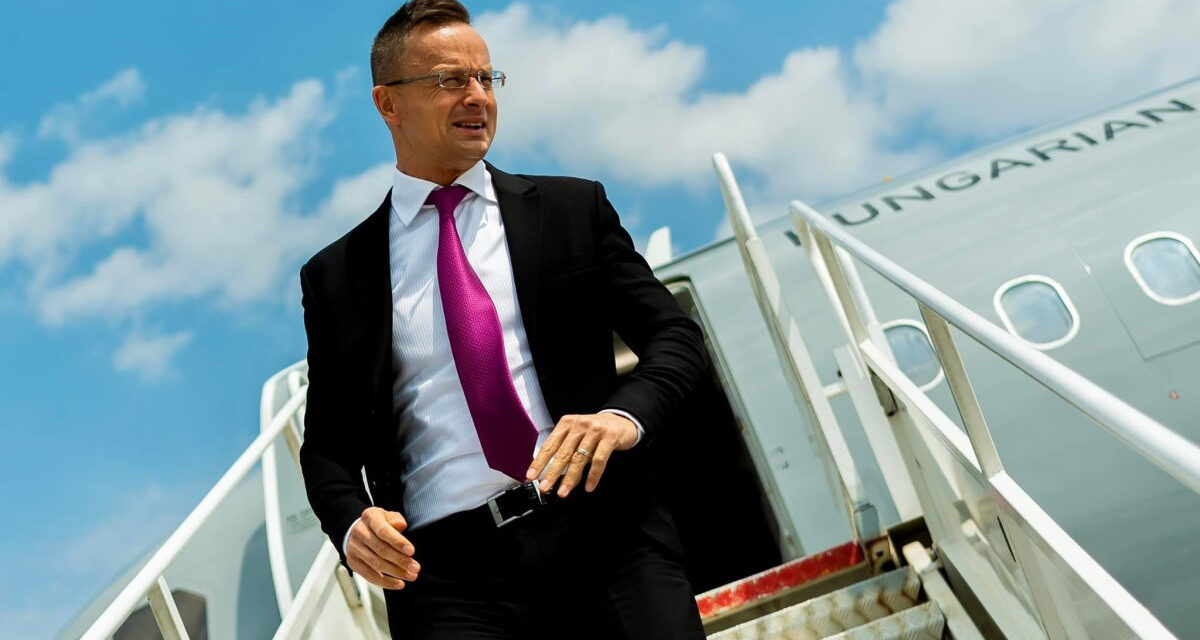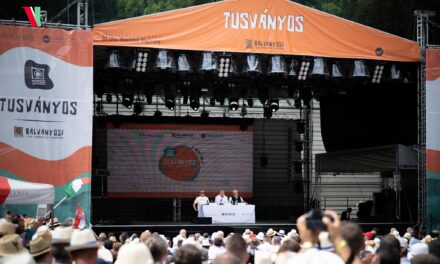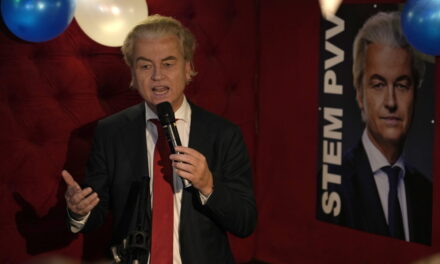Slovak election results, European Union political issues, relations with Russia, energy security, war in Ukraine and good neighborly relations - Péter Szijjártó does not hide his opinion. Interview.
The Minister of Foreign Affairs and Trade also revealed what he would do with those ambassadors who interfere in the internal affairs of the given country. The head of the ministry also made it clear what can help Sweden's NATO membership.
The interview took place on October 2, 2023.
Perhaps one of the most important things for us is that there were elections in Slovakia, and it brought a result that has both good and bad sides.
First of all, we would like to express our joy, because our neighbor had an election, as a result of which there is an excellent chance that a stable Slovak government will be established. Our relationship with Slovakia is a critically important issue from a foreign policy point of view. There are several reasons for this: first of all, we have the longest border with Slovakia, 654 kilometers, so obviously we are trying to establish the best possible cooperation. On the other hand, Slovakia is our third most important trade partner, last year we carried out a trade turnover of 17 billion euros. And thirdly, four hundred and sixty to four hundred and seventy thousand Hungarians live there, who represent a very important link between the two countries.
From our point of view, the most important thing is for Slovakia to have a stable, predictable government again, with which we can discuss important issues in the long term, along strategic issues, in the hope that we will meet the same politician at the next meeting.
It is also gratifying, of course, that a party won the election, whose leader openly represents a position very similar to that of the Hungarian government on the three most important topics: the issue of peace, and the rejection of migration and gender propaganda. These are three very important issues pressing Europe today, and it is good to have an ally in the European debates. Of course, we would have been happier if the party representing Hungarians from the Uplands had also entered the Slovak parliament. Unfortunately, this was not successful, but at the same time, the achievement should be applauded from the point of view that neither a Hungarian party nor a Hungarian party president has received so many votes in the Slovak parliamentary elections in the past decade and a half. What conclusions should be drawn from all this is not my business.
The Vice-President of the European Commission, Vera Jourová, immediately after saying that they recognize Fico's victory...
Even better…
His next sentence was that Russia decided the election.
When a patriot, a politician who prioritizes national interests, or a political family who opposes the liberal mainstream in Brussels, wins an election or has a chance to do well in an election, pressure, attack, and stigmatization immediately come from Brussels. It must be seen that today the political discourse in Europe has sunk to such an extent that anyone who refuses to join the Brussels mainstream, who refuses to deliver weapons, who refuses to take the position of the European mainstream regarding the war in Ukraine, is immediately labeled as Moscow's spy, Putin's friend, the Russians he is called a propagandist. Quite simply, Brussels does not provide a platform for common sense democratic debate on these issues.
In the light of the Slovak elections, the voices of peace seem to be getting stronger. For example, what can we expect in Poland? There, too, there seems to be a sense of sanity in the case of Ukraine.
We really support our Polish brothers and sisters, we support the ruling party to win the election, because politics is a genre of experience, and in recent years we have been able to think about the development of cooperation between Hungary and Poland effectively, standing on the ground of mutual respect, with the current Polish government. I think both countries benefited a lot from this. Of course, we have taken different approaches to the issue of the war in Ukraine, but this in no way hinders cooperation in other areas, such as a very decisive action against illegal migration, preventing the introduction of mandatory quotas or even a joint stand for family and Christian values. Another issue is that it can be sobering for the Poles as well, that after they helped the Ukrainians the most in Europe, they started suing the Poles at the World Trade Organization, which is inexplicable.
Sweden wants to become a NATO member. Is there an immediate danger that makes this extremely important? Also, how compatible is a country that does not respect the sovereignty of other countries with the principles of NATO?
The main problem is that the Swedes repeatedly insulted and insulted Hungarian parliamentarians. In order for Hungary to ratify Sweden's accession to NATO, the members of parliament are needed, and it does not depend on the government from here on. The government presented its proposal. I think that if I ask something from someone, I expect something from someone, then I approach them with respect. Compared to that, what has happened here in recent years? Several hundred kilometers to the north, Swedish politicians continuously, grandiosely and humiliatingly described Hungarian democracy, cast doubt on the democratic quality of the Hungarian political system, and presented us as a dictatorship, or at least an autocratic system. A significant number of our members of parliament have successfully won the parliamentary election four, five, or even six times already. In a real campaign, in a real political contest, they got real votes from real people, in a democratic contest, basically in the rural constituencies, where you really have to meet the people and where there is accountability.
Compared to this, these representatives have to face the fact that they are pompously taught from Sweden, hundreds of kilometers from here, that this is not even a democracy.
I think that after this, it is possible to understand the position of the Hungarian parliamentarians, that until these insults are settled, they do not wish to deal with this issue for the time being. Especially after the fact that even Swedish children are taught that what is here in Hungary is not democratic.
He met with Russian Foreign Minister Sergei Lavrov a week ago, and he said that the 1956 history falsification scandal was also discussed. Or, more precisely, the question of what is taught in Russia about 1956. What did your Russian colleague tell you? Also, did they talk about why it was necessary to change the textbooks?
I raised this issue. It is unacceptable to classify the Hungarian heroes of the 1956 revolution as fascists. The fact that the people standing for Hungarian freedom and Hungarian sovereignty are heroes, we are not even willing to open a debate on this at any level, because it is a fact. The foreign minister's colleague made it clear that in this matter they take the statement of President Vladimir Putin as authoritative, which the president made a few days before our meeting, and which formulated a clear position. At the same time, it is also evident that we will never be on a common denominator with the Russians in terms of the past. That we would be on a common denominator with those who experience as liberation what we experience as occupation. So, since we will never be able to reach a common denominator regarding the past, we must shape our relationship system with this in mind.
Energy issues were also discussed at these meetings and discussions. Will we get cold in Hungarian apartments? Will there be anything to refuel the car?
Hungary's energy supply is safe, because we were able to keep the cooperation between Hungary and Russia pragmatic and based on common sense. My minister colleague also assured me that Russia and Russian companies will fulfill all their contractual obligations that they have undertaken with regard to Hungary, deliver the quantities of natural gas, petroleum and nuclear fuel stipulated in the contracts, and so far our experience is in line with this statement. We are well prepared for the upcoming heating season, the capacity of the Hungarian natural gas storage tanks is well above the European average, and the continuously arriving shipments ensure the country's energy supply for the winter period.
I would bypass the institution of the right of veto in Brussels. For years, there has been a debate about whether a member country is free to have a different opinion than the majority. Or should this be taken into account? And it also includes the fact that if the right of veto is abolished, the first thing that will be voted on immediately will be the migrant pact.
When we are held responsible for rule of law issues from Brussels, it is ridiculous for two reasons. On the one hand, because it has no real basis. Hungary is a functioning democracy, a functioning state of law, we are no worse in this respect than any other European Union country. On the other hand, it is also ridiculous because these accusations are made from a place where the functioning of the rule of law is not applied to themselves in any way.
Today in Brussels, the European rules that were clearly needed to preserve the unity of the European Union on the most important issues are being disregarded.
Migration is also such an issue. After all, with this shameful procedure, they are trying to impose the distribution of migrants by violating European rules and the principle of unanimous decision-making and disregarding the positions of the member states. With this, they want to wrest the right from the hands of the European countries so that everyone can decide for themselves who they want to let into their own country and with whom they are willing to live there. It is clear that such a decision can only be made if everyone agrees to it, and we do not agree to this.
In connection with the right of veto, the question arises in the mind of a person with common sense, that the other countries do not think that Hungary or Poland are now on the stage, but can anyone get there at any time?
When these people speak honestly behind closed doors, not playing to the public or the liberal media, not afraid of pressure from NGOs, then they clearly say - especially the foreign ministers of the smaller member states - that they, for their part, also insist on unanimous decision-making for mechanism.
Let's talk diplomacy. When you appoint an ambassador or appoint a diplomat, you entrust him with diplomatic tasks or send him there to intervene in domestic politics, say the Hungarian ambassador in Berlin or Washington.
I am appointing ambassadors in order to develop the relations between the two countries in such a way that Hungary can benefit from it. So, the ambassador's task is to build the best possible relationship between the two countries in order for Hungarian companies to be able to assert themselves as much as possible on the market of the given country, and to bring job-creating investment from the given country, if possible.
I expressly forbade each and every ambassador - this is a rule here at the Ministry of Foreign Affairs - to participate in actions affecting the domestic politics of the given country, and they cannot even express an opinion on domestic political issues, because that is not their job. They are not paid for this, but to develop relations between the two countries. If there were an ambassador who interfered in any issue affecting the domestic policy of the given country, took a position, took part in a joint European action without my permission, then of course the consequence would be immediate repatriation.
Now we talked about the American ambassador, David Pressman, so that…
"...that we never named him." Of course, the American ambassador always gets a lot of attention because he represents the United States of America. But he is not the only one, that is why I sat down with the ambassadors of the European Union member states before the parliamentary elections last year and told them clearly so that everyone could understand:
don't interfere in the Hungarian election process, don't play proxy, don't organize actions, don't express an opinion, simply don't interfere.
This was already leaked by me threatening them in disguise. Which is not true, because I openly threatened them that our professional cooperation would become impossible if they interfered in the Hungarian election process. This should be as obvious as two times four.
The full interview can be read in Magyar Nemzet!
Featured image: MTI












